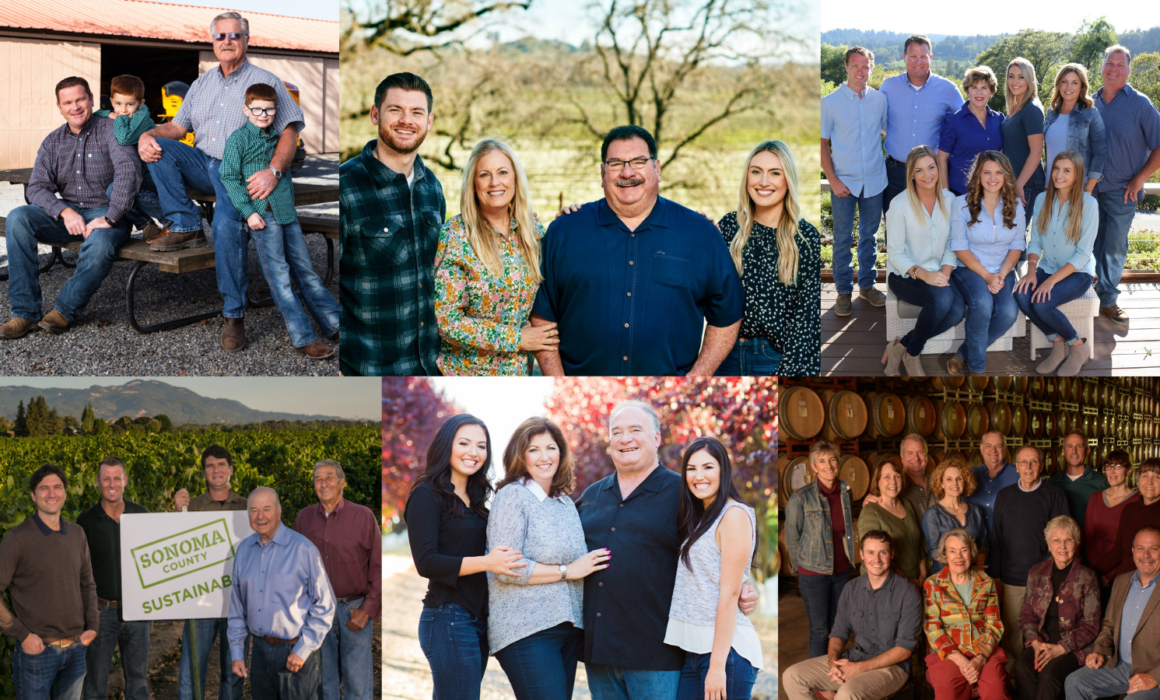All in the Family: The Vast Majority of Sonoma County Vineyards and Wineries are Family-Owned
By Virginie Boone
Unfortunately, it’s not too uncommon to see a winery or vineyard in our region described as “one of the few family-owned.” But in Sonoma County, nothing could be further from the truth, as a vast, vast majority of both wineries and vineyards here are very much family-owned and run. To see it described otherwise is simply wrong.
Of course family-owned businesses can come in different sizes. Gallo, Jackson Family, Foley Family, Delicato and Boisset are families of a more considerable size than smaller one-vineyard or one-winery operators. And still, even when you take those larger players out, Sonoma County remains significantly family-owned.
In Knights Valley, Knights Bridge, Peter Michael and the vineyards owned by Philippe Melka and Luc Morlet belong to families. Ehret Family Winery and Donelan Family Wines also maintain vineyards here.
In Alexander Valley, Marietta, J. Rickards, Blue Rock Vineyard, Trione, Trentadue, Alexander Valley Vineyards, Hawkes, Hanna, Robert Young, Silver Oak, Stuhlmuller, Jordan, Garden Creek, Warnecke Ranch & Vineyard and Skipstone are among the winery estates run by families, while Jackson Family has Stonestreet and Verité.
Dry Creek Valley boasts a majority of family-owned estates including Zialena, Fritz, Sbragia, Dutcher Crossing, Preston, David Coffaro, Bella, Reeve, Rued, Unti, Amista, Mauritson, Saini, Nalle, Comstock, A. Rafanelli, Passalacqua, Kokomo, Papapietro Perry, Lambert Bridge, Walt Baca, DaVero, Orsi Family, Tongue Dancer and Mill Creek, not to mention Dry Creek Vineyard, started in 1972, and Pedroncelli, which dates back to 1927.
Chalk Hill, though a small appellation, has Foley Family’s Chalk Hill and Roth estates, but also family-owned Medlock-Ames, Lurton Estate, Calluna and Notre Vue.
Russian River Valley is full of family-owned vineyards and wineries, from Acorn/Alegria Vineyard to Lynmar, Ramey and Paul Hobbs, with Rodney Strong, Aperture, Twomey, Arista, Benovia, Flowers, Rochioli, Bricoleur, Porter Creek, Korbel, Martinelli, Hartford Family, Woodenhead, Balletto, Inman Family, Dehlinger, Dutton-Goldfield, Dutton Estate, Croix Estate, Cirq/Chev, Ron Rubin, Cartograph, Domaine de la Riviere, Joseph Swan, Emeritus, Small Vines, Freeman, Marimar Torres, Square Peg, Chenoweth, Iron Horse, Joseph Jewell, Senses and many others in-between. Gallo runs J Vineyards and Winery.
Russian River Valley/Green Valley of Russian River Valley is also home to highly sought-after family-run vineyards like Ritchie, Bacigalupi, Bush-Crispo, Charles Heintz, Calegari, Keefer Ranch, Kanzler Estate, Gantz Family and Sanchietti Ranch, among others.
Along the West Sonoma Coast and Fort-Ross Seaview AVAs are vineyards owned and farmed by family producers such as Hirsch, Fort Ross Vineyard, Flowers, Peay, Peter Michael, Wayfarer, Black Kite, Cobb, Littorai, Failla, Ernest, Ceritas, Senses, Three Sticks, Alma Fria, Occidental, RAEN and Red Car.
Sonoma Valley and Sonoma Mountain also continue to have many family-owned producers running properties, like B.Wise/Amapola Creek, Talisman, Laurel Glen, Belden Barns, En Garde, Lasseter, Hamel Family, Abbot’s Passage and Beltane Ranch; Van der Kamp Vineyard on Sonoma Mountain grows sought-after Pinot Noir. On Moon Mountain, Hanzell, Kamen, Stone Edge Farm Estate and Winery Sixteen 600/Enterprise Vineyards are all family-owned, alongside the vineyards of Kistler, Montecillo and Monte Rosso.
Carneros is also home to many family-owned entities, from Sangiacomo Family Vineyards, Buena Vista, Gundlach-Bundschu, Scribe, Anaba, LaRue, Schug, Cline Family, Ceja and The Donum Estate, to Patz & Hall, which was just bought back from corporate ownership by co-founder James Hall. In nearby Petaluma Gap, Keller Estate is family-owned, while Terrade Promissio remains a sought-after Sonoma Coast Pinot Noir and Chardonnay grower just outside of Petaluma.
Honestly, Sonoma County is so full of family-owned vineyards and wineries this has been an exhausting – if not exhaustive – list to compile. And family-owned means the challenges are different for every one of these families, whether it’s access to capital or trouble finding labor or planning for succession.
Ultimately, to survive one has to be sustainable, not only environmentally and socially but fiscally. It cannot be easy, which is all the more reason we need to acknowledge that there’s nothing “few” about family-owned in Sonoma County.


